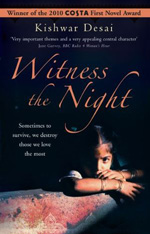

Beautiful Books, paperback, 9781905636853
It is September 2007, and police in the Punjab region of India ask social worker Simran Singh for her help in talking to an uncommunicative fourteen-year-old girl. The girl, Durga, was found loosely tied up and raped in her partially burned house, surrounded by her murdered family. The family is extremely wealthy and prominent in the town, and the police are anxious to close the case by drawing out Durga's confession to murdering the thirteen victims. Simran, however, is suspicious of the story and sets out to uncover what really happened, and to make sure the young girl receives justice. She soon learns that no one she encounters—from the authorities, to extended family members, to the girl's handsome tutor—is prepared to speak the truth. Instead she is met with seemingly endless corruption, concealment and obfuscation that she must pick through to find what really happened. She soon discovers that the only other female child in the family, Durga's older sister, disappeared mysteriously a few years before. In her quest to uncover the facts of the case, Simran comes across myriad and inventive ways that unwanted females are disposed of in Indian culture.
Witness the Night is a blending of murder mystery and social commentary. I haven't read many mysteries in the past decade or two, so I may not be a good judge of that aspect of the book. I certainly found it an interesting, page-turning adventure, and I enjoyed the unique twist of using a social worker as a detective. As for the social justice aspects, Desai effectively weaves in her critiques of patriarchy and misogyny in traditional India, and makes them integral to the story itself. For anyone unfamiliar with femicide in India, this novel provides an effective illustration of the horrors of the practice.
Each chapter begins with an entry from Durga's diary, and ends with e-mail messages between Simran and Durga's sister-in-law who lives in Britain. Both of these add background information to the story that otherwise would be impossible for Simran to know. I'm not sure that this technique actually works here. The diary does not sound like the writing of a traumatized teen, and further, it contains spoilers that lead to a somewhat predictable ending; this, however, did not get in the way of my interest in the story.
With her strongly non-traditional ways, I thought Simran was quite a likeable character. This unmarried, 45-year old "NGO-wali" smokes cigarettes, drinks whiskey and beer—alone, even!—and she's forever trying to convince her mother that it's time to give up on the dream of grandchildren.
While the book is not perfect, it is a fine effort for a first novel. The Costa Award jury agreed, as they
awarded Witness the Night the 2010 First Novel Award. For those of us who enjoy this story, Desai
is at work on another mystery featuring her social worker detective Simran Singh.
